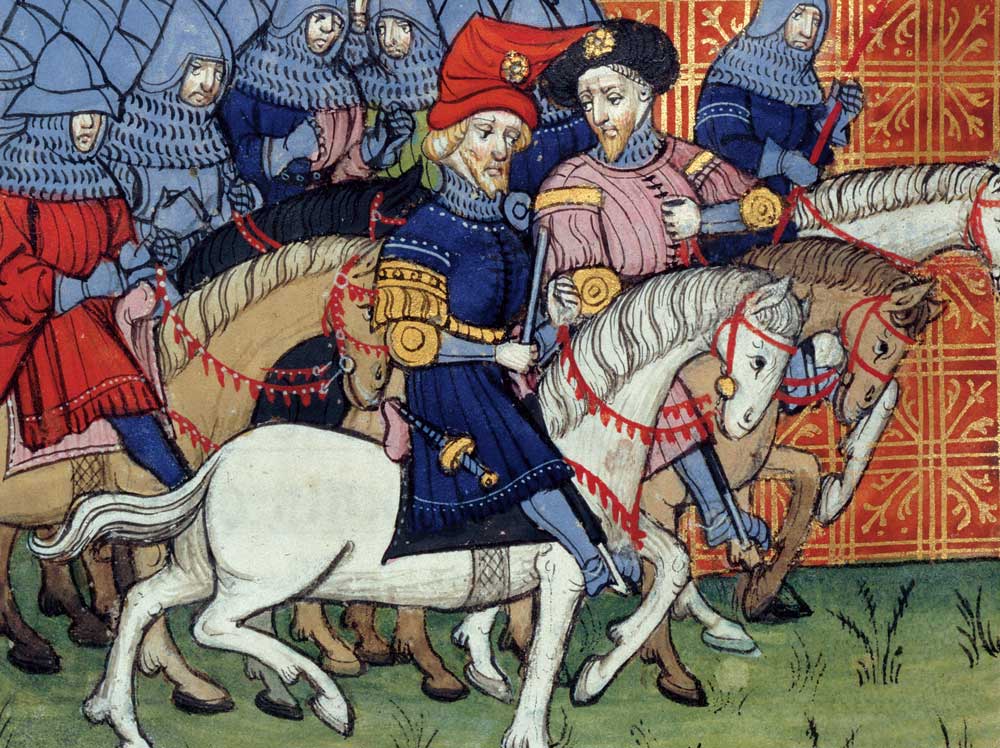
Edward I’s unconventional methods of recruiting an army for war against the French in 1294 have received a substantial amount of negative attention. Late medieval historians have generally viewed the king’s decision to enlist criminals and outlaws for his campaign in Gascony – through the grant of a royal pardon, and then to provide them with wages at 3d. per day – as an overreach of the royal prerogative and an abuse of the act of mercy.
A short roll call of some of these recruits would support this. Both William Le Fevre and John Semot were recruited having been imprisoned for larceny. Both survived the campaign yet, perhaps unsurprisingly, Le Fevre returned to a life of crime and was hanged for robberies in Newcastle four years later. Similarly, Roger of Penteneye returned to England within a year, having previously been imprisoned for murder. Also present was Adam Russel of Bradewell who was pardoned for ‘homicides, larceny, robbery and other felonies’, along with Roger de Bosevile who had committed larceny and had provided shelter for fellow fugitives at his home. Similarly John Rachel was pardoned for murder and ‘diverse robberys’, while Adam Le Warrener accepted terms for military service overseas after being outlawed for his escape from a Warwick jail.
Recruitment also included individuals who had committed crimes against women and Jews, a reminder of the vulnerability of widows in society, as well as antisemitism in the years following the expulsion of the Jews in 1290. In the first expeditionary force were George Le Carpenter and Geoffrey Payn, the former having been imprisoned for the death of Alicie of Warwick, the latter for the murder of Cecilie, a widow. Richard and John Boloyn, William Baron and John Le Westerne were just a handful of recruits associated with killing or robbing members of the Jewish community. It is likely that these individuals had been emboldened by claims that Jews still practised usury even after it had been abolished in 1275, and they may have also acted upon the groundless stories that children had been murdered and tortured by Jewish communities in Lincoln and Northampton. Regardless of the criminals’ motives, it is clear to see that the recruiting agents cared little for the gender or religion of the recruit’s victim, as long as they could serve a military purpose in southwest France.
Yet, for a king who had actively spent the first 20 years of his reign introducing legal reforms, Edward’s willingness to undo these policies almost overnight is difficult to understand. Two years into his reign, in 1275 Edward had enacted the Statute of Westminster, which contained a clause highlighting the attempt to prevent intrusion: ‘No lock, door, window or any sort of fastening to be opened or broken’ was a warning to any would-be trespasser that the new regime would not turn a blind eye to breaking and entering. In 1285, the Statute of Winchester announced the setting up of watch and wards at night and the closing of town gates between sunset and sunrise, while highways were cleared of trees and bushes to prevent ambush. If Edward was intent on addressing lawlessness in the localities, why implement such a potentially damaging recruitment policy?
In the first instance it must be considered that the failure to raise a feudal host by the date of embarkation in early October – most likely because many farmers and labourers who usually made up the quota of voluntary troops opted to collect the harvest rather than to join up with the rest of the army at Portsmouth – coupled with a Welsh rebellion, meant that Edward needed a substitute body of soldiers. He received this with the arrival of 300 criminals and outlaws, an almost equal number to his men-at-arms. Second, the type of attritional, low-skilled warfare practised in the Anglo-French war, from siege to scorched earth, suited the potential military capabilities of these recruits. And third, the king’s recruitment policy complemented the legal reforms of the first half of his reign in effectively removing some of the most callous members of English society to a foreign land, where the possibility of death from armed conflict or diseases like typhoid was significantly greater than that of their return.
Edward I’s unprecedented move to enlist known felons proved so successful that it changed the face of English military recruitment. The opening years of the Hundred Years War (1337-53), for example, witnessed the release of 3,500 criminals. In 1344 alone around eight per cent of the infantry was the product of Edward I’s recruitment policy, while just under 2,000 pardons were distributed to willing criminals who took part in the Crécy campaign two years later. Attempts were made at the parliament of 1351 to limit the number of pardons being granted due to concerns that citizens feared reprisals from their former attackers, yet this did little to stem the tide: by the end of the 14th century almost 40,000 pardons had been granted.
The truth was that a controlled cohort of criminal recruits could fill the basic military needs of the English captains at little expense: the pardoned recruits offered a strategic purpose in lieu of a feudal or arrayed host, while those in charge of the army cared little for the individual recruit’s past offences if they could wield basic weaponry, such as a knife or bow. War in Europe also offered a timely opportunity to rid England of some of its criminals. It is telling that Edward had expressed an urgency to remove those from the realm who were ‘doing mischief’ in the forests. Unfortunately for the innocent civilians living in the undefended towns of the French countryside, a far from chivalric force was soon at their doorstep.
Adam Drake researches medieval Anglo-French military relations.
from Hacker News https://ift.tt/i4c8FRh
No comments:
Post a Comment
Note: Only a member of this blog may post a comment.